Projects

Our researchers are involved in several projects that belong to (at least) one of our three main topical areas. Below you find an overview of all projects, current or completed, per topical area.
Sustainable Society
Citizen Energy Communities
Project (Law Sector Plan funded): “’Citizen Energy Communities’: Exploring Innovative Private Relationships for Ensuring Public Goals in the EU Energy Sector”
Principle Investigator: Dr. Lea Diestelmeier

Summary
The public – private dimension has always been central to the energy sector. The first energy systems in the 1880s were often privately owned. However, with the upscaling of technology, economies of scale, and the growing importance of energy for society, it was a political choice to nationalise energy supply systems. Vertically integrated public companies were assigned the task of energy supply and were responsible for facilitating public goals. Commencing in the 1990s, the liberalization of the EU energy sector progressively unbundled network operation from production and supply, and public interests had to be explicitly assigned to different actors.
With the progression of the energy transition, however, new actors are entering the scene. Especially at local levels, a variety of stakeholders engage in the energy sector. The EU directive on the internal electricity market (2019/944/EU) introduces “Citizen Energy Communities” (CEC) (art. 2(11)) which brings together public and private actors in one entity. CECs are envisaged to take on a novel role in the energy sector by combining public “community” interests with private structures. This requires (re-)defining and evaluating the public – private dimension in the context of the liberalised energy sector and the aim to facilitate the role of CEC in the energy transition.
Output
Successful grant application related to this project:
- Dr. Lea Diestelmeier (REPP-funded), as co-applicant (main applicants Dr. Tineke van der Schoor and Lies Oldenhof from the Hanze University of Applied Science) received a RAAK-mkb grant awarded by the Dutch Research Council (NWO). Project title: Cooperatief in balans: Innovatieve duurzame energiediensten. Duration: January 2021-December 2023. https://www.nwo.nl/en/projects/raakmkb12009
Presentations at international conferences of this project:
- Dr. Lea Diestelmeier (REPP-funded) participated as a speaker in the 6th international energy law and policy conference “Energy Transitions 2020” organized by the University of Eastern Finland (UEF) Law School in cooperation with the UEF Centre for Climate Change, Energy and Environmental Law (CCEEL), 27-28 February 2020 in Joensuu, Finland. The theme of the conference was “Achieving Just Energy Transitions through Law and Policy: Challenges and Solutions”. Title of the conference paper presented: “Citizen Energy Communities as Vehicle for a Just Energy Transition in the EU – Legal Challenges for the Implementation”.
The conference paper was then further developed in a peer-reviewed article which was published in an international academic journal at the beginning of 2021:
- L. Diestelmeier, `Citizen Energy Communities as a Vehicle for a Just Energy Transition in the EU – Challenges for the Transpositio´, 1 Oil, Gas & Energy Law Intelligence (19) 2021.
In this contribution Dr. Diestelmeier explores the role of “citizen energy communities” (as introduced by Directive 2019/944/EU) as a protective measure for vulnerable customers or customers who are unable to participate in the energy transition. The EU legislator envisages consumers to “take ownership of the energy transition and to benefit from new technologies”. While this promises an empowered role for consumers, not all consumers will be able to participate as “owners of the energy transition” and subsequently suffer from being in a disadvantaged position in the market. This essentially bears the risk of an unjust energy transition. To what extent this risk can be mitigated by ‘Citizen Energy Communities’ is explored in this article.
Selected articles:
-
A. Stroink, L. Diestelmeier, T. Wawer and J.L. Hurink, ‘Benefits of cross-border citizen energy communities at distribution system level ’, Energy Strategy Reviews (40) 2022
One challenge of the EU energy transition is the integration of renewable electricity generation in the distribution system. EU energy law proposes a possible solution by introducing “citizen energy communities” (Directive 2019/944/EU) which may be open for “cross-border participation”. This article proposes an innovative way of implementing such cross-border communities by linking distribution systems via a “switchable element”, a generation, storage, or consumption asset with a connection to each country. An optimization model has been developed to calculate the system cost savings of such a connection. Linking regions with complementary characteristics regarding electricity generation and demand via a switchable element leads to more efficient system utilization. Findings are relevant for the transposition of “citizen energy communities” in national laws.
The Forced Sale of Homes
Project (Law Sector Plan funded): “The forced sale of homes”
Principal Investigator: Dr. Irene Visser
Summary
The forced sale of registered property needs to be avoided as much as possible, because most of the time it entails losses and unnecessary transaction costs. However, such a sale is sometimes unavoidable. In these cases, it is important that the forced sale system works properly. This is of relevance in the first place for those directly involved: the mortgage lender (the creditor) and the owner (the debtor). But there are also public interests involved, like the financing of homes and financial stability. This research aims to develop a sustainable system of forced sales, which will lead to the optimal regulation of all public and private interests involved and that will be resistant against future economic and financial crises. This goal fits within the domain of a sustainable society. Important aspects of the Law Sector Plan are involved, like the question which level of regulation (public or private actors) is preferable, and the question whether it is better to give the debtor an active role in the forced sale procedures. Other disciplines, like economics, social and spatial sciences, will be involved in this research.
Output
Upcoming event:
- Expert meeting in Groningen with experts in the field of foreclosures (planned for October/November 2021), organised by Dr. Irene Visser
Secondary project
Sub project (Sector Plan funded): : “Impact of ECHR on the forced sale of homes”
Principal Investigator: Dr. Irene Visser
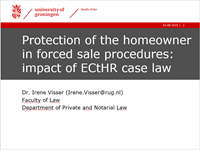
Summary
International human rights law is important for the forced sale of homes. More and more case law of the European Court of Human Rights (ECtHR) shows the influence of Art. 1 of the First Protocol and Art. 8 ECHR on the forced sale of homes. This project investigates the influence of this case law in forced sale procedures, especially the (Dutch) procedures in which only private actors are involved.
Output
Presentation of this project at international conferences:
- Presentation by Dr. Irene Visser at the conference ‘Housing for the next European social model’, European Network for Housing Research, Athens 28 August 2019
In 2017, the European Court of Human Rights decided that Slovenia ‘failed to strike a fair balance between the aim sought and the measure employed in the enforcement proceedings’ against Mr. Vaskrsić. In this case, the creditor sold the family home of Mr. Vaskrsić for a claim of (initially) 124 euro. It follows from the Vaskrsić v. Slovenia case that, under certain circumstances, the domestic authorities have to investigate ‘other suitable and less onerous measures’ in enforcement procedures. This and other cases emphasize the importance of homeowner protection in forced sale procedures. They also raise questions about the responsibilities of the parties involved in a public auction. In this presentation, I gave an overview of the ECtHR case law concerning the forced sale of homes to examine the main key characteristics that need to be taken into account. Furthermore, I focused on the responsibilities of the actors coordinating the forced sale of homes in the different Contracting States. Earlier research has shown a wide variety of actors assume such a role– in the Netherlands, for example, the notary is in charge, while in Germany the forced sale takes place before a judge. This presentation therefore also contributed to the discussion on how to protect public interests: by public of private interference?
Maintenance Nowadays
Project (WODC funded): “Maintenance nowadays”
REPP participants: Dr. Irene Visser, Prof. Dr. Leon Verstappen, Prof. Dr. Wilbert Kolkman
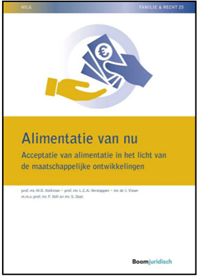
Summary
This study, which has been commissioned by the Research and Documentation Centre (WODC), concerns the question whether the current maintenance law needs to be brought up to date. It examines the ‘acceptance’ of maintenance by parties, the extent to which it meets the demands of today’s society – consider, for example, the position of unmarried cohabitants – and possible alterations of laws and regulations, partly with the aim of preventing legal proceedings. The answer to the aforementioned research question is provided on the basis of four sub-topics. The research into these sub-topics was conducted according to a fixed pattern of four steps: 1. The collecting of existing data, 2. generating new data (i.e. conducting a questionnaire survey and interviews), 3. analysing the data and 4. testing the findings during expert meetings (triangulation).
In-depth
The basis for spousal maintenance is solidarity. This solidarity entails various approaches with different implications:
- Solidarity that marriage implies and that leads to a reciprocal duty of care during and after the marriage in order to be able to continue to live as much as possible at the same level of prosperity despite being separated;
- Solidarity that marriage implies and that leads to the contribution to the recovery of care-related loss of earning capacity during the marriage in order to build economic independence after marriage;
- Solidarity that marriage implies and that leads to compensation for unpaid work in the household or in the business during the marriage;
- Solidarity that (also) implies that the duty of care is not being passed onto society.
A fixed, concrete and thus clear basis has as a drawback that it can become outdated and as a consequence no longer contributes to the acceptance of maintenance. For this reason, a broad concept of the basis of solidarity, which accommodates its various approaches, is to be preferred over a narrowly formulated basis. There is no need for the law to be amended to integrate all these different approaches in the Trema standards (Tremanormen). This is only necessary if case law of the Supreme Court in particular shows that the statutory provisions contain obstacles to a broad and flexible interpretation that may include all these approaches of the solidarity concept.
For child maintenance, the legal basis is provided by the responsibility for the care and upbringing of minor children; there is hardly any discussion about this, with the exception of stepparent maintenance. Partly in view of the increased number of patchwork families, stepparent maintenance is in need for reconsideration. This at least requires a normative assessment of the basis for the maintenance obligation for the various maintenance debtors with respect to children. Child maintenance for young adult persons should also be reconsidered. On the one hand, we recommend restricting this type of maintenance to young adults who are following education or studies (for others the requirement of need applies), while on the other hand, we suggest extending child maintenance for young adult persons until the age of twentyfour, when the young adult can be considered to have completed the education or study.
Economic independence of both ex-partners is the best remedy to avoid any maintenance having to be paid. However, the social developments show that it is utopian to assume that such independence will be achieved across the board in the coming decades. Although progress has been made regarding the education and labour participation of women, their economic position after a divorce still lags behind that of men. This is mainly due to the role allocation during marriage, the level of education and cultural background. Maintenance law will have to continue to take this into account for the coming decades.
Maintenance is a topic on which opinions are divided on many points. The primary reason for this is the fact that maintenance debtors and recipients often have conflicting interests. The various experts are involved in maintenance from different perspectives as well. Consequently, they assess the various elements of the system of partner and child maintenance in different ways. Whether an element contributes to the acceptance of maintenance or whether it rather decreases the acceptance rate can therefore not be answered uniformly for all parties involved. Only on few aspects does there exist a significant unanimity, one example being the basis for child maintenance.
However that may be, partner and child maintenance obligations are generally properly observed and the number of legal proceedings concerning maintenance has been declining for years. This already shows that both partner and child maintenance are accepted, even though people do not agree with certain elements of the system. A low degree of acceptance therefore does not automatically mean a high degree of readiness to start legal proceedings and vice versa. There are many other reasons for people to institute legal proceedings, such as a difficult preliminary process, rising emotions or a change in circumstances that, with or without the help of their experts, the ex-partners cannot resolve.
The Trema standards form a successful instrument that contributes to the predictability of the law and its uniform application in the Netherlands. They are, however, in need of revision. This revision may include increasing the readability and accessibility, drawing up guidelines for frequently occurring situations, filling existing gaps, and providing criteria to determine which guidelines can be applied to which situation.
When revisiting the Trema standards, greater account should be taken of the different approaches of solidarity as a basis for spousal maintenance, so that the standards are brought more in line with social views and developments. The insight is gaining ground that a divorce brings with it a change in income position and that adhering to marriage-related prosperity, the disposable family income, is not (any longer) the most obvious starting point for determining the need.
With a thorough revision, the application and manageability of the Trema standards can be extended or improved. New concepts such as care maintenance, the child bank account (kinderrekening) but also (more) fixed sums and flat rates for partner maintenance, including the (amended) court of appeal standard (the so-called Hofnorm), and room for co-parenting will then increase the palette of tools for the courts, legal aid providers and, last but not least, the parties involved to take appropriate measures. Many calculation problems will be eliminated once maintenance is being fully exempted from taxes. Redemption of maintenance should be determined by the court upon request.
More calculation methods should be developed within the Trema standards that can be applied in various standard situations. One can take as a basis a single comprehensive model with more fixed sums and flat rates, from which the different variants for the various standard situations can be derived. In that case, criteria also need to be established that indicate in which cases these variants can be applied. Deviations from the modals and fixed sums and flat rates are of course always possible if special circumstances demand this, but it is then necessary to make clear on what grounds this is justified. Changes in maintenance should only be allowed if these result in a determination that differs more than a certain percentage from the original amount.
Such thresholds prevent minor adjustments from triggering legal proceedings.
There is a great disagreement concerning the answer to the question whether maintenance obligation should also exist for informal cohabitants. Seeing the social developments, it may be worth considering introducing such a lex specialis. The maintenance arrangement could be the same as that for married persons, with the addition of an opt-out option. This opt-out option would in any case mean that cohabitors to whom the maintenance obligation would apply can jointly choose not to have this obligation apply to them. Unmarried persons qualify for this new arrangement when they ‘live together as if they were married’ in the sense of article 1:160 Dutch Civil Code during a specific period of time, or if they have one or more children together.
Output
Grant awarded for this project:
Dr. Irene Visser (REPP-funded), as co-applicant (main applicants Prof. Dr. Leon Verstappen, Prof. Dr. Wilbert Kolkman received a research grant awarded by the Wetenschappelijk Onderzoek- en Documentatiecentrum (WODC) in 2019 to conduct research on the acceptance of the current maintenance obligation under Dutch law.
Recent publication arisen from this project:
W.D. Kolkman, L.C.A. Verstappen & I. Visser, Alimentatie van nu. Acceptatie van alimentatie in het licht van de maatschappelijke ontwikkelingen (Familie & Recht deel 25), Den Haag: Boom juridisch 2021
Sustainable Housing
Project (funded by other sources): Sustainable housing
Principal investigator: Prof. Dr. Leon Verstappen
Summary
By 2030, CO2 emissions in the Netherlands must be at least 49 percent lower than emissions in 1990. One of the measures needed to achieve that goal is to make 1.5 million existing homes more sustainable. That example alone shows that the energy transition will have a significant impact on the housing market. The recommendations on sustainable living make an important contribution to the legal aspects of the energy transition. To this end, the eight recommendations, provided by a total of fourteen experts, explore where the notarial sustainability challenges lie in the coming years, place them in the perspective of the larger sustainability agenda and consider private law, public law and tax law questions that need to be answered in the light of the energy transition. The editing was done by Leon Verstappen and Fokke Jan Vonck.
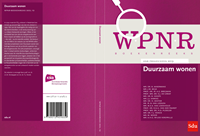
Output
Publications arisen from this project:
- Duurzaam wonen. / Verstappen, L.C.A. (Editor); Akkermans, Bram; Beijk, Jan-Willem; Bregman, Arjan; Hoops, Björn; Karens, Jacco; Koster, Harold; van Loenen, Bas; van der Paardt, Rene; Ploeger, Hendrik; Vonck, Fokke Jan; Wever, Moniek; Wilod Versprille, Arnaud. Sdu Uitgevers, 2019. 256 pages.
Sustainable Consumer Finance
Project (funded by other sources): “Sustainable Consumer Finance”
Principal Investigator: prof. dr. Olha O. Cherednychenko
Summary
Sustainable financial products and services for consumers and SMEs are an important prerequisite for sustainable development. The global financial crisis of 2007-2008 has underlined the need for regulatory and supervisory reforms to control the excesses in which financial institutions were indulging pre-crisis and to ensure adequate consumer/client protection across the EU. At present, however, many issues still exist concerning the way in which retail financial services should be regulated and supervised, particularly in the context of the ‘green transition’ and digital transformation. New ways of addressing tensions and contradictions between the common good and individual preferences of market actors in the retail financial markets are needed in order to be able to address these issues. This project conducted within the Groningen Centre for European Financial Services Law explores this broad theme, drawing on the results of large-scale project ‘Towards Sustainable Financial Practices’ funded by the University of Groningen with the framework of its investment agenda 2015-2018.
Output
Publications:

- O.O. Cherednychenko, 'EU Financial Regulation, Contract Law and Sustainable Consumer Finance'. In E. van Schagen, & S. Weatherill (eds), Better Regulation in EU Contract Law: The Fitness Check and the New Deal for Consumers . (Studies of the Oxford Institute of European and Comparative Law; Vol. 29). Hart Publishing / Bloomsbury Publishing (2019), pp. 61-91.
- O.O. Cherednychenko & J.M. Meindertsma, 'Irresponsible Lending in the Post-Crisis Era: Is the EU Consumer Credit Directive Fit for Its Purpose?' (2019) Journal of Consumer Policy 42(4), pp. 483-519.
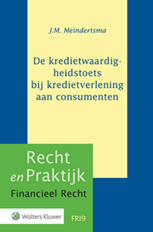
- M.E. Buit, 'Consumer Peer-to-Peer Lending and the Promise of Enhancing Access to Credit: Lessons from the Netherlands'. In C. G. Stănescu, & A. A. Gikay (Eds.), Discrimination, Vulnerable Consumers and Financial Inclusion: Fair Access to Financial Services and the Law . Routledge (2021), pp. 166-185.
- O.O. Cherednychenko, ‘De civiele zorgplicht van financiële instellingen’. In D. Busch, K. Lieverse & J.W. van der Velden (red.), Leerboek financieel recht . Ars Aequi Libri (2021), blz. 657-602.
- M.E. Buit, 'Consumenten-peer-to-peer lending-platformen als kredietaanbieders: Een heroverweging noodzakelijk?' (2020) Tijdschrift Financieel Recht in de Praktijk 6(3), blz. 53-60.
- O.O. Cherednychenko & M. Wallinga. ‘Europese consumentenbescherming op financiële markten’. In E. H. Hondius, & V. Mak (Red.), Handboek Consumentenrecht: Een overzicht van de rechtspositie van de consument . Uitgeverij Paris (2020), blz. 363-389.
- J.M. Meindertsma, De kredietwaardigheidstoets bij kredietverlening aan consumenten . (Recht en Praktijk - Financieel Recht; Vol. FR19). Wolters Kluwer (2020).

Research impact:
- Revision of the 2008 Consumer Credit Directive
Following, among others, the study on Irresponsible consumer credit lending across the EU in the post-crisis era conducted by Prof. Olha Cherednychenko and Dr. Jesse Meindertsma for the European Commission Directorate-General for Financial Stability, Financial Services and Capital Markets Union (FISMA) in 2018, the European Commission has decided to review the 2008 Consumer Credit Directive. The problems identified by the Commission in its Inception Impact Assessment of June 2020 reflect the conclusions of the study by Cherednycheno and Meindertsma as published in their article 'Irresponsible Lending in the Post-Crisis Era: Is the EU Consumer Credit Directive Fit for Its Purpose?' in Journal of Consumer Policy (2019).
- Prof. Olha Cherednychenko speaker at the public hearing European Parliament on financial consumer protection
On Thursday 18 March 2021, Olha Cherednychenko, Professor of European Private Law and Comparative Law, spoke at the public hearing of the European Parliament Committee on the Internal Market and Consumer Protection (IMCO). The hearing was devoted to consumer protection in the context of the digitalisation of retail financial services and the Covid-19 pandemic. Olha Cherednychenko proposed major revisions to the 2008 EU Consumer Credit Directive which is currently being reviewed by the European Commission. More information about the hearing, including the video, can be found at the IMCO website.
Other presentations:
- Presentation by Olha Cherednychenko ‘Corona and Credit Debts’ at the online symposium ‘Corona and the Law - Dutch-German Experiences’, Oldenburg, Germany, 28 October 2020.
- Rabobank-lezing by Olha Cherednychenko ‘Zorgplichten in het publiek- en privaatrecht’, Utrecht, 23 januari 2021.
Sustainable Markets and Competition Law
Project (funded by other sources): “Sustainable Markets and Competition Law”
Principle Investigator: Prof. Dr. Hans Vedder
Summary
We live in a market economy. This means that the market forces dictate what is produced, unless the state intervenes. Competition is thus the main decentralised distribution mechanism. To protect competition, the state has enacted competition laws, but these laws are increasingly challenged by the need for sustainability in two distrinct but related ways. Sustainability is a challenge to competition law as it is widely observed that the market results in overexploitation of the natural resources that are available to us. Sustainability also poses a challenge as technological advances change the very foundations of our thinking about markets and the decentralised distribution that is inherent in them. As a result, competition law needs to be rethought and more fundamentally the public private divide must be rethought. In a society in which private parties wield very considerable powers and are the key to our long-term prosperity, competition law as a backbone of our regulation of these private parties can play a major role as a catalyst.
Output
Publications :
- Tempelman, D. G., & Vedder, H. H. B. (2020). Energie – het toenemend hybride karakter van de consumentenbescherming in het energierecht. Tijdschrift voor Consumentenrecht & Handelspraktijken, 2020(3), 135-145.
- Vedder, H. H. B. (2019). United in What Diversity? (Un)Communautaire Reasoning in Applying Competition Law to the Public-Private Divide on Two Sides of the Atlantic. In F. Amtenbrink, G. Davies, D. Kochenov, & J. Lindeboom (Eds.), The Internal Market and the Future of European Integration: Essays in Honour of Laurence W. Gormley (pp. 350-369). Cambridge University Press.
- Vedder, H. (2018). Don't Be Evil - Can We Teach Algorithms Not to Break Competition Law? In M. Veenbrink, A. Looijesteijn-Clearie, & C. S. Rusu (Eds.), Digital Markets in the EU (pp. 25-33). (Radboud Economic Law Series; Vol. 2). Wolf Legal Publishers.
- Vedder, H. (2017). Integrating rather than juxtaposing environmental policy and the internal market. In P. Koutrakos, & J. Snell (Eds.), Research handbook on the law of the EU's internal market (pp. 171-190). (Research Handbooks in European Law ). Edward Elgar Publishing.
Research impact:
- The research on this theme is presented both nationally and internationally and has come to the attention of, for example, the European Commission in its formation of a new policy as regards competition law and collective bargaining by self-employed persons. Prof. Vedder is widely quoted by Dutch national media on seminal cases involving ‘Big Tech’ and competition and has advised the Netherlands Parliament on this matter.
Legal Infrastructure of Markets
Household Energy Supply Disconnections as a Violation of Human Rights
Project (Law Sector Plan funded): “Household Energy Supply Disconnections as a Violation of Human Rights”
Principle Investigator: Dr. Marlies Hesselman
Summary
This project investigates whether and how disconnections of energy supplies to households due to a household's inability to pay should be seen as a violation of their human rights. The project examines and compares international, regional and national law and case-law on household energy supply disconnections, with a special focus on Europe, and with particular attention to evidence of legal recognition of a new "human right to energy". Based on such a new "right to energy", or existing human rights more broadly, governments would be obliged to regulate companies in the public interest, and to protect the rights of vulnerable individuals associated with access to essential energy services. In particular, a rights-based perspective on energy may involve a shift of viewing energy not merely as a private, commercial or commodifiable good, traded by companies on markets, but also as a public, social or common good, which is of primary importance to each human being for their health, well-being, life and social inclusion, and for which the State bears some responsibility. Such a change in perspective means that access to energy must be differently regulated, in a more protective and social manner, adequately safeguarding the public interest in the context of private relationships. In turn, this raises questions of how the burdens and benefits of energy services provision are best or most fairly distributed, i.e. amongst households, companies and States involved?
In EU law, the shift towards regulating household access to energy services on ground of public interests or "human rights" is well visible, e.g. through Article 36 of the EU Charter for Fundamental Rights, Principle 20 of the EU Pillar on Social Rights, and in secondary EU energy law. This project will also examine ongoing and new regulatory efforts of EU Member States to effectively prohibit or prevent disconnections of vulnerable households in line with human rights, as well as new legal requirements to protect vulnerable households against disconnections according to EU Directive 2024/1711 on improved electricity market design.
Output
Relevant outputs related to this project include:
- Marlies Hesselman, Energie als mensenrecht: Juridische verankering en implicaties voor Nederlands energiearmoede-beleid (2024) Nederlands Tijdschrift voor Energierecht 148-162
- George Jiglau, Marlies Hesselman et al, Energy and the social contract: From “energy consumers” to “people with a right to energy” (2024) Sustainable Development 1321-1336.
The Rise of AI
Project (Law Sector Plan funded): “The Rise of AI: The Interplay Between Transparency and Intellectual Property”
Principle Investigator: Ida Varosanec LLM
Summary
The widespread utilisation of artificial intelligence (AI) necessitates regulation to enable trust in such systems through the transparency of AI processes. However, intellectual property (IP) rights impede achieving transparency. Since the current state of affairs in the protection of AI (and human-generated works) where trade secrets are the most common current tool of regulation, self-regulatory arrangements impact society in a way that exacerbates mistrust in AI. Moreover, the increased use of AI in the automation of public services necessitates transparency guarantees, even when relying on private contractors who wish to maintain IP protection of their technology.
The present research delves into this unstudied problem that is currently placing the public interest of transparency in opposition with the private interest governed by the traditional narrative of IP law. As such, it is at the intersection between public and private law, and public and private interests. Since the European Union (EU) is in the process of developing AI regulation, there is a need to rethink and re-represent these interests. Hence, this research project seeks to ascertain the possibility of their coexistence within the evolving EU framework for AI, which lacks clarity on legal requirements for transparency and the role of IP rights in the regulation of AI.
Cracking the Code
Project (Law Sector Plan funded): “Cracking the Code: A Multilevel, Good Governance Approach to Business, Human Rights and Artificial Intelligence”
Principal investigator: Dr. Lottie Lane
Summary
The way in which public interests are protected in private relationships requires rethinking, as existing modes of protection are insufficient in the protection of human rights from businesses developing artificial intelligence – this was not envisaged in the current international human rights law framework, in which there are significant gaps in protection. These gaps pertain not only to the vast and fast-paced developments in technological capabilities that continue to occur, but also to the position of businesses under international human rights law. Although developments to ensure human rights protection from businesses are ongoing (e.g., the development of EU legislation on mandatory human rights due diligence for businesses) and new governance initiatives have been adopted, these are typically ad hoc and many are responses to a particular situation giving rise to an acute need for regulation. Crucially, the precise human rights responsibilities of businesses developing AI require clarification.
So far, responses to the problem of AI and human rights have been rather disjointed, overlapping governance activities by an abundance of actors, including academics, private companies, international organisations, governmental bodies, and (coalitions of) experts. Such governance efforts are to be applauded and are certainly of value. However, the effective protection of human rights requires the rethinking of existing regulatory models to improve coordination, more comprehensive protection, and a more concrete and coordinated governance system capable of adaptability and flexibility as AI technology continues to evolve and pose new challenges to human rights protection.
This project seeks to provide some solutions to these issues by addressing the following primary research question using a law-and-governance approach: In the absence of a comprehensive governance regime for AI and human rights and in light of the key position of private companies therein, how can a multi-level good governance approach be applied to best regulate AI and ensure its compatibility with human rights? This includes consideration of: the human rights responsibilities of businesses developing AI; existing governance activities that have been taken in relation to AI and human rights; the meaning of ‘good governance’ and what this requires in the present context; how a multi-level governance system could be organised here and the role of different actors therein; and the measures that should be taken under such an approach to better protect individuals’ human rights.
Output
Grant awarded to this project:
Dr. Lottie Lane (REPP-funded), as co-applicant, received the Netherlands Network for Human Rights Research workshop organisation grant awarded by the Netherlands Network for Human Rights Research for an international workshop on “Artificial Intelligence: The New Frontier of Business and Human Rights” (scheduled for fall 2021).
Grant applications submitted in the framework of this project:
An application based on this project has been submitted by Dr. Lottie Lane (REPP-funded) to the 2021 pre-proposal round of the NWO Talent Programme Veni Social Sciences and Humanities.
International academic events organised in the framework of this project:
- International workshop on ‘Artificial Intelligence: The New Frontier of Business and Human Rights’ (upcoming event planned for fall 2021), co-organised by Dr. Lottie Lane.

- International conference of the Netherlands Network for Human Rights Research Working Group on Business and Human Rights, “The Gender Dimension of Business and Human Rights”, Utrecht University, 9 October 2019 (co-organised by Dr. Lottie Lane)
This workshop brought scholars together to provide an overview of the ‘state of the art’ within business and human rights in relation to gender issues and to facilitate a constructive dialogue around potential spaces for collaboration and paths forward. The workshop featured presentations by Professor Surya Deva (member of the UN Working Group on the issue of human rights and transnational corporations and other business enterprises), Marian Ingrams (OECD Watch/SOMO), Nadia Bernaz (University of Wageningen), Elin Wrzoncki (Danish Institute for Human Rights), Kelly Groen (ActionAid) and Tara van Ho (University of Essex). A report on the discussions and outcomes of the workshop can be found here.
- International conference panel on “The EU Due Diligence Initiative: Promises, Possibilities and Pitfalls”, Panel of the Business and Human Rights Working Group at the Annual Toogdag of the Netherlands Network for Human Rights, 1 July 2020 (organised by Dr. Lottie Lane)
In the context of the Toogdag 2020, the business and human rights working group hosted a panel discussing the European Commissioner for Justice's recent commitment to new legislation on mandatory human rights and environmental due diligence in EU company supply chains. Working group chair Chiara Macchi (Wageningen University) introduced the topic and moderated the session. Lise Smit (British Institute of International and Comparative Law) introduced the background to the initiative, including her work with BIICL and the EU Commission report. Ekaterina Aristova (Oxford University) discussed the broader trend towards mandatory due diligence and what this might mean for the EU initiative. Nicolas Bueno (University of Zurich) provided insights into parallel national initiatives and how the pertains to the EU initiative. The panel closed with a Q&A session. The presentations of the speakers are available online, and a commentary on the discussions was written by Ben Grama and Lottie Lane for the ‘Human Rights Here’ blog.
International academic events where this project was or will be presented:
Upcoming events:
- Guest lecture by Dr. Lottie Lane on ‘Corporate Responsibility and Artificial Intelligence” at the Asser Institute’s Winter Academy on Artificial Intelligence and International Law, The Hague, 18 February 2021.
- Dr Lottie Lane will participate as invited discussant at the Netherlands Network for Human Rights Research PhD Forum, panel on “Business and Human Rights” (online), 22-23 February 2021.
- International colloquium (online) on “Artificial Intelligence and Normative Challenges: International and Comparative Legal Perspectives”, organized by the Faculty of Law of the Aristotle University of Thessaloniki and the Kalliopi Koufa Foundation for the Promotion of International and Human Rights Law, with the support of the European Society of International Law, 1-2 April 2021. Paper to be presented by Dr. Lottie Lane on “Protecting human rights through AI law and policy: A multi-level comparative analysis”.
Past events:
- International conference (online): Association of Human Rights Institutions, “The Future of Human Rights: Socio-Economic Rights, Equality and Development”, Pretoria, 3-4 September 2020. Paper presented by Dr. Lottie Lane: “Algorithmic Decision-making and Businesses’ Human Rights Responsibilities”
This presentation introduced the human rights challenges and responsibilities under international human rights law of businesses developing artificial intelligence. Focus was placed on the UN Guiding Principles on Business and Human Rights and challenges of transparency and accountability.
- International conference (online symposium): “The Horizontal Effect of Human Rights in the UK and Beyond: An Emerging Transnational Discipline?”, Durham, 14 September 2020. Paper presented by Dr. Lottie Lane: “The Horizontal Effect of International Human Rights Law: A Comparative Analysis of the Practice of Selected Human Rights Treaty Bodies”
This presentation provided an overview of the different ways in which international human rights law is applied in cases concerning harm caused by non-State actors in the practice of five UN human rights treaty bodies. The analysis showed that two main methods are used: 1) ‘pure’ indirect horizontal effect (reliance on States’ positive obligation to protect human rights from third party interference); and 2) ‘categorical’ indirect horizontal effect (recategorizing non-State actors as public actors for specific purposes).
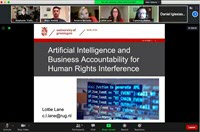
- International conference (online) “Artificial Intelligence and Business Accountability for Human Rights Interference”, V Coimbra International Conference on Human Rights, 13-15 October 2020. Paper presented by Dr. Lottie Lane: “Artificial Intelligence and Business Accountability for Human Rights Interference”
This presentation provided an overview of the current level of accountability of businesses developing artificial intelligence (AI) under international human rights law and governance. Over 100 law and policy instruments dealing with AI ethics and human rights issues arising from AI were assessed in order to identify what is currently expected of businesses developing AI and how this contributes to their human rights accountability.
Governance, Health and HR Responsibilities of Public/Private Actors
Project (Law Sector Plan funded): “Good governance, health and the human rights responsibilities of public and private actors”
Principle Investigator: Dr. Lottie Lane
Summary
Ensuring good governance and the effective protection of human rights requires an understanding of accountability, transparency and participation as core elements of good governance. In the field of health, and in particular areas such as access to medicine and tobacco control, the private sector can wield a huge amount of influence over public actors. This necessitates paying particular attention to businesses operating in these spheres, and especially how good governance and international human rights law apply to them. Additionally, States’ incorporation of good governance and human rights standards into domestic law in the field of health requires further examination.
Output
Grant application submitted in the framework of this project:
Dr. Lottie Lane (REPP-funded) is co-collaborator on a funding proposal to the Social Sciences and Humanities Research Council of Canada. The application is entitled: ‘Legislating for good governance in the pharmaceutical sector', and was submitted in October 2020 by Prof. Jillian Kohler (University of Toronto; Director of the WHO Collaborating Centre for Governance, Transparency and Accountability in the Pharmaceutical Sector), with Dr Katrina Perehudoff (University of Amsterdam) as co-collaborator.
Insolvency Without Liquidation
Project (Law Sector Plan funded): “Insolvency without liquidation”
Principal Investigator: Dr. Arpi Karapetian
Summary
Following the entering into force of the ‘Act on Dutch Court Confirmation of Extrajudicial Restructuring Plans to avert Bankruptcy’ (Wet homologatie onderhands akkoord, WHOA) on 1 January 2021, the need for balancing public interests of business rescue and private interests of creditors has become highly significant. The new procedure offers failing companies a new restructuring tool according to which they may offer their creditors and shareholders a plan to restructure their debts. The procedure contains a court ratification of the plan in which classes of creditors and shareholders can be overruled. With the WHOA, Dutch insolvency law now contains a new insolvency procedure in addition to the existing liquidation procedure (faillissementsprocedure). The new procedure is designed to avert liquidation. As a result, many questions arise regarding the nature of insolvency, the interrelationship between the different insolvency procedures and their influence on rules in liability law, contract law, property law and criminal law.
These issues surrounding insolvency and the restructuring of failing companies, specifically illustrate that public interests have the potential to affect private relationships. In recent years, public interests of business rescue and job preservation have found their way into insolvency law where traditionally private interests of creditors dominated the legal discourse. The emergence of public interests in insolvency law gives rise to different questions that touch upon the taunt relationship between public interests and private interests. In the search for answering the above mentioned questions, this project seeks to establish a balanced approach where both public interests and private interests are considered.
Output
Grant applications submitted in the framework of this project:
An application based on this project has been submitted to the 2021 pre-proposal round of the NWO Talent Programme Veni Social Sciences and Humanities.
Grants awarded in the framework of this project:
- Dr. Arpi Karapetian (REPP-funded), as one of the main applicants (other main applicants included Prof. Dr. Frank Verstijlen and Prof. Dr. Loes Lennarts), received a grant awarded by the Wetenschappelijk Onderzoek- en Documentatiecentrum (WODC). Project topic: the position of unsecured creditors in insolvency. Duration: December 2020-June 2021.
The position of unsecured creditors in the Dutch liquidation procedure (faillissement) is considered dire with a recovery rate of around 2%. Since funding a company’s activities commonly involves the company's assets being encumbered with security rights, unsecured creditors oftentimes have to write off their debt if the company enters a liquidation procedure. Security holders will, after all, take exclusive recourse against the company’s assets by virtue of their security rights. In this project, we seek to answer the question if and if so, how the position of unsecured creditors can be improved in the liquidation procedure.

Upcoming events:
- Presentation of a book chapter entitled ‘Bestuurdersaansprakelijkheid onder de WHOA’ (Directors’ liability under the WHOA) at the launch of the book ‘WHOA’ which will be published in the ‘Recht en Praktijk serie Insolventierecht’, Wolters Kluwer 2021. The event will take place on 4 March 2021.
- Interdisciplinary conference in Groningen which Dr. Arpi Karapetian co-organized on the duties and responsibilities of the liquidator in insolvency from the perspective of both insolvency and administrative law. Dr. Arpi Karapetian will also act as a speaker. The conference will take place in May 2021.
- Lecturer at the ‘Specialisatieopleiding Faillissementsfraude’ which will take place in December 2021, organized by Kennisplatform faillissementsfraude.
Recent publication:
- A. Karapetian & F.J.M. Verstijlen, ‘De grenzen van de bestuurs-en strafrechtelijke verantwoordelijkheid van de curator’, Tijdschrift voor Insolventierecht 2020/4.
Seven Proposals to Change Book 5 of the Dutch Civil Code
Project (funded by other sources): “Seven legislative proposals to change Book 5 of the Dutch Civil Code”
Principal investigator: Prof. Dr. Leon Verstappen

Summary
On February 23, 2019, five detailed draft bills on various themes from Book 5 BW were presented in a special edition of WPNR. These arose from the KNB recommendations ‘Book 5 of the Dutch Civil Code of the future’ from 2016 on possible amendments to Book 5 of the Dutch Civil Code, provided by a total of eighteen experts. A first version of these and other proposals, such as, for example, a new regulation for floating buildings and possible amendments to the apartment legislation, had already been included in the aforementioned recommendations and was discussed during the KNB/WPNR congress on 8 March 2016. The draft bill on possible adjustments of our apartment legislation has been published in the WPNR book series in 2020. See also the WPNR theme issue ‘Apartment law in motion’, with a contribution from Björn Hoops, among others, about the draft bill on apartment law. In 2021, a diptych about floating buildings by Hendrik Ploeger and Pernille van der Plank.
For all draft bills in this project, 45 civil society organizations were contacted and asked to respond on the draft bills that were presented to them. The idea was that, by listening to the organizations involved in this preparatory phase in order to better identify the needs in practice and then - if necessary or desirable - adapt the draft bills, we can ultimately come up with more balanced and better proposals that can count on societal support.

Output
With publishing the draft bill on floating buildings, the preparatory work on all draft bills has been completed and the Ministry of Justice and Security can take up the challenge to bring these proposals to parliament. The whole project was developed and executed (including editing all publications) by Leon Verstappen.
The minister of Justice and Safety has announced in October 2016 that he would consider to adopt these draft bills and submit them as legislative proposals to parliament.
Publications arisen from this project in 2019-2020:
- Vervolg ‘Boek 5 BW van de toekomst’ : De eerste vijf ontwerpwetsvoorstellen. / Verstappen, L.C.A. (Editor and author); Vonck, F.J. (Guest editor and author). In: WPNR Weekblad voor Privaatrecht Notariaat en Registratie, Vol. 2019, No. 7227, 23.02.2019, 55 pages.
- Vervolg ‘Boek 5 BW van de toekomst’ : Het ontwerpwetsvoorstel appartementsrechten. / Verstappen, L.C.A. (Editor); van der Vleuten, Mechteld; de Jong, Ingrid; Oomen, Kees; Brinkhuijsen, Rene ; Siewers, Claudia; de Laat, Richard ; Luijk-van Veldhuizen, Astrid ; Vonck, Fokke Jan (Editor). Sdu Uitgevers, 2020, 190 pages.
- Appartementsrecht in beweging. / Verstappen, L.C.A. (Editor); Vonck, Fokke Jan (Editor). In: WPNR Weekblad voor Privaatrecht Notariaat en Registratie, Vol. 2020, No. 7297, 03.10.2020, 32 pages.
Market Regulation and Private Law within the EU Multi-Level System of Governance
Project (funded by other sources): “Market Regulation and Private Law within the EU Multi-Level System of Governance”
Principal Investigator: prof. dr. Olha O. Cherednychenko
Summary
Private law has been traditionally conceived as that part of the law which secures a sphere of positive freedom for private parties and is concerned with interpersonal justice. In contrast, market regulation has been commonly associated with a distinctive set of rules adopted for instrumental purposes, such as the prevention of market failures and distributive justice. Over the past several decades, however, the dichotomy between private law and market regulation has become blurred. In particular, traditional national private law, notably contract and tort law, has been viewed by the EU as an instrument for achieving market integration, leading to the emergence of legal hybrids, such as ‘European regulatory private law’ and ‘European supervision private law’. Conversely, the traditional private law discourse in national legal systems has been increasingly influenced by policy considerations, both in individual and interest-group litigation before civil courts. This project explores the interplay between market regulation and private law within the EU multi-level system of governance.
Output
Publications:
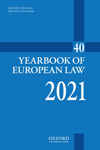
- O.O. Cherednychenko, 'Regulatory Agencies and Private Damages in the EU: Bridging the Gap between Theory and Practice' (2021) Oxford Yearbook of European Law 40, pp. 146-171.
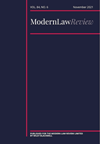
- O.O. Cherednychenko, 'Islands and the Ocean: Three Models of the Relationship between EU Market Regulation and National Private Law', (2021) The Modern Law Review 84(6), pp. 1294-1329.

- O.O. Cherednychenko, 'Rediscovering the Public/Private Divide in EU Private Law', (2020) European Law Journal 26(1-2), pp. 27-47.
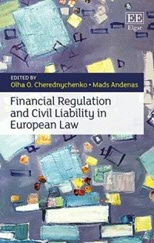
- O.O. Cherednychenko, 'Two Sides of the Same Coin: EU Financial Regulation and Private Law', (2021) European Business Organization Law Review 22(1), pp. 147-172.
- O.O. Cherednychenko & M. Andenas (eds), Financial Regulation and Civil Liability in European Law. Edward Elgar Publishing (2020).
- O.O. Cherednychenko, 'Financial Regulation and Civil Liability in European Law: Towards a More Coordinated Approach?' In O.O. Cherednychenko & M. Andenas (eds), Financial Regulation and Civil Liability in European Law . Edward Elgar Publishing (2020), pp. 2-46.
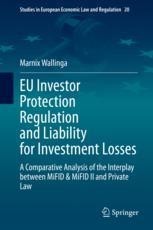
- M.W. Wallinga, EU Investor Protection Regulation and Liability for Investment Losses: A Comparative Analysis of the Interplay between MiFID & MiFID II and Private Law . (Studies in European Economic Law and Regulation; Vol. 20). Springer (2020).
- M.W. Wallinga, ‘Why MiFID & MiFID II Do (not) Matter to Private Law: Liability to Compensate for Investment Losses for Breach of Conduct of Business Rules’, (2019) European Review of Private Law 27(3), pp. 515-556.
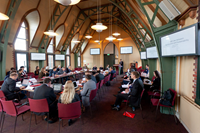
Past academic events:
- International Conference ‘Private Law and Market Regulation in the Face of Contemporary Grand Challenges’, 9-10 December 2019.
On 9-10 December 2019, the Faculty of Law of the University of Groningen hosted an international conference ‘Private Law and Market Regulation in the Face of Contemporary Grand Challenges’. The conference was organized by Prof. Olha O. Cherednychenko.
The aim of this conference was to explore the interplay between private law and market regulation within the EU multi-level system of governance and beyond in the face of contemporary grand challenges. Among such challenges are climate change mitigation, a switch to a resource efficient circular economy, and the digitalisation of the marketplace and societies at large.
The keynote was given by Prof. Hans-W. Micklitz (European University Institute (EUI), Florence). Among the speakers were also Prof. Cynthia Williams (Osgoode Hall Law School, York University, Toronto); Prof. Hugh Collins (London School of Economics and Political Science); Prof. Michael Faure (University of Maastricht); Prof. Takis Tridimas (King’s College London); Prof. Gerald Spindler (University of Göttingen); Prof. Vanessa Mak (University of Tilburg); Prof. Geraint Howells (City University of Hong Kong / University of Manchester); Prof. Martijn Scheltema (Erasmus University Rotterdam); Prof. Mads Andenas (University of Oslo / Institute of Advanced Legal Studies (IALS), University of London); Prof. Christian Twigg-Flesner (University of Warwick); Dr. Agnieszka Janczuk-Gorywoda (University of Utrecht); Prof. Hanoch Dagan (Tel-Aviv University); Dr. Andrea Fejos (University of Essex); Prof. Giuseppe Bellantuono (University of Trento); Dr. Edmund Schuster (London School of Economics and Political Science); Dr. Kai Purnhagen (Wageningen University); Prof. Peter Rott (University of Kassel); Dr. Yane Svetiev (University of Sydney/Bocconi University, Milan); Prof. Jan Biemans (University of Utrecht); Dr. Federico Ferretti (University of Bologna); Prof. Chris Willett (University of Essex); Dr. Mateja Durovic (King’s College London); Martha Buit (University of Groningen).

The conference concluded with the inaugural lecture by Prof. Olha O. Cherednychenko appointed as Professor of European Private Law and Comparative Law at the University of Groningen. The topic of her speech was ‘The Public/Private Divide and European Private Law’.
Freedom and Protection
Collective Redress and the Individual
Project (Law Sector Plan funded): “Individual Rights and Public Interests in Collective Redress”
Principle Investigator: Pim Wissink LLM
Summary
Recent years have seen an increasing adoption of collective redress mechanisms by European nations in response to the challenges posed by mass damages cases. Like traditional individual redress, collective redress primarily aims to protect private interests by providing effective relief to individuals who suffered some harm due to, for example, violations of consumer law. By enabling qualified entities to sue for damages on behalf of a group of victims, practical barriers that prevent individuals from vindicating their rights, such as cost or inexperience, can be overcome, thus improving access to justice. However, collective redress mechanisms are often also intended to advance certain public interests, such as effective private enforcement of the law and reducing the burden that mass damages cases impose on courts.
In many ways, collective redress is a shift away from the traditional private law paradigm. Its large-scale and collective nature necessitates mandatory group representation and a ‘generalized’ judicial assessment, which is at odds with traditional private law notions of individual autonomy and individual justice. Moreover, any one individuals’ private interests are no longer central to the proceedings, but will instead have to contend with (potentially divergent) collective and public interests. Therefore, the collectivization of private law redress warrants a rethinking of the individual’s legal position.
Output
Academic events organised in the framework of this project:
- Conference on International Class Action Regimes and Settling Mass Personal Injury
This conference brings together an international group of academic experts along with experienced judges and legal professionals. The group will share their insights on the collective redress and resolution of complex mass harm cases in the United States, Brazil, Israel and the Netherlands. The conference, planned to take place in June 2021, has been organised by prof.dr. Charlotte Pavillon, prof.dr. Albert Verheij and Pim Wissink (LLM) and has been made possible with the support of Stichting Onderzoek & Ondersteuning Collectieve Acties.
Restricting Consumer Choice of Law
Project (Law Sector Plan funded): “Restricting Choice Of Law in EU Consumer Contracts: Still Necessary to Protect the Consumer?”
Principle Investigator: Benedikt Schmitz LLM
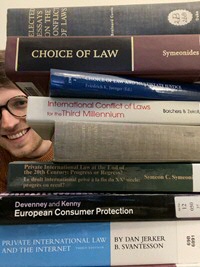
Summary
Traditionally, Private International Law (PIL) is value neutral. If one were to believe Savigny, PIL should not consider the contents of a contractual relationship. Savigny uses multilateral conflict rules. These rules point towards the country in which a certain connecting factor is situated. Savigny is the starting point of PIL in the EU, but the EU frequently deviates from Savigny.
EU PIL aims at protecting the consumer. Art. 6(2) Rome I Regulation grants parties the possibility to choose the applicable law. Yet, the mandatory rules of the place of habitual residence of the consumer can continue to apply if these rules provide better consumer protection. On one hand, there is the public interest of consumer protection. On the other hand, there is the private interest of freedom of contract and party autonomy. Additionally, the rule in Art 6(2) might be too inefficient from a PIL perspective.
The EU protects consumers through other ways than PIL, too. Consumer law legislation is already doing that on a substantive level. The question therefore is: Do we still need the restrictions of Art. 6(2) to protect the consumer? The hypothesis is: no.
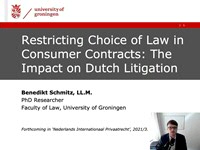
Output
Publications:
-
B. Schmitz, ‘Rethinking the Public Interest in Consumer Protection’, European Journal of Comparative Law and Governance 2022, 2, p. 210-235.
- B. Schmitz. ‘Rechtskeuze in consumentenovereenkomsten: Artikel 6 lid 2 Rome I-Verordening en de Nederlandse rechter’, Nederlands Tijschrift voor Internationaal Privaatrecht 2021, 3, p. 507-531.
Presentations:
- Restricting Choice of Law in Consumer Contracts: The Impact on Dutch Litigation. Presented at the Society of Legal Scholars Conference in Durham, UK, on 31 August 2021.
Other activities:
- (Co-)Organizing a Dutch- en Afrikaans-language conference on 'Fundamental Rights in Private International Law' on 16 June 2022 in Leuven, Belgium, financed by the Belgian Tijdschrift voor Privaatrecht.
The Public-Private Challenge: Fundamental Rights Horizontality
Project (partly Law Sector Plan funded): “The Public-Private Challenge: The Horizontal Effect of Fundamental Rights in Private Relationships”
Principal investigator: Prof. Dr. Dr. Aurelia Colombi Ciacchi
Summary
This project explores, from an innovative angle, a classic interaction between public interests and private relationships: the effects of fundamental rights and (public) constitutional principles on the adjudication of private litigations. It embraces both a comparative law and a EU law dimension. Firstly, it critically compares different theories, practices and cultures of the effects of fundamental rights and constitutional principles in private relationships at a national level in a number of European countries. Secondly, it investigates the direct effects of EU fundamental rights in private relationships at the EU level.
Output
Publications arisen from this project:
- A.L.B. Colombi Ciacchi, ‘Judicial Governance in European Private Law: Three Judicial Cultures of Fundamental Rights Horizontality’, European Review of Private Law (28) 2020, 4, p. 931-952
This paper sketches and compares, in the light of the author’s approach to judicial governance, different models of application of fundamental rights by civil courts. It proposes a taxonomy of three cultures of fundamental rights horizontality: (1) the post-authoritarian culture, (2) the old continental culture, and (3) the Nordic-insular culture.
The first culture is characterized by a relative distrust in Parliament, a relatively strong judicial activism, and the primacy of national constitutional rights. It can be observed in relatively young continental European democracies that had transformed themselves into totalitarian or authoritarian regimes at some point in the 20th century, such as Germany, Italy, Portugal, Spain, and new EU Member States such as Poland.
The second culture is characterized by a relative trust in Parliament, a moderate judicial activism, and the primacy of international human rights. It can be observed in France and the Benelux countries, which are old continental European democracies that did not transform themselves into authoritarian regimes in the 20th century.
The third culture is characterized by judicial restraint and the difficulty to internalize international human rights law. It can be observed both in the Nordic countries and in the UK, which are old European democracies based on non-continental constitutional models.
- A.L.B. Colombi Ciacchi, ‘The Direct Horizontal Effect of EU Fundamental Rights’, European Constitutional Law Review (15) 2019, p. 294-305
This paper comments on the Egenberger and IR v JQ decisions of the Court of Justice of the European Union (CJEU) from both an EU law and a comparative law perspective. The author welcomes the courageous statements made by the Court in these judgments, which enhance the constitutionalisation of both European private law and EU law in general. On the one hand, these two decisions have confirmed and reinforced well-known case law principles on the direct horizontal effect of the prohibition of discrimination in (private) labour relationships which have evolved in a coherent line that started with Defrenne and continued on through Mangold, Kücükdeveci, and DI. On the other hand, however, Egenberger and IR v JQ went beyond those rulings in at least three regards. First, they clearly acknowledged the direct horizontal effect of Article 21 and (at least) the direct effect of Article 47 of the Charter. Third, Egenberger clarified the compatibility of the direct (horizontal) effect of Articles 21 and 47 of the Charter with the obligation of national courts to balance competing fundamental rights.
Ultimately, although Egenberger and IR v JQ have limited the autonomy of religious organisations to some extent, they did not interfere with the freedom of national courts to balance competing fundamental rights according to national constitutional values.
Presentations of the results of this project at international conferences:
- Presentation of Aurelia Colombi Ciacchi at the conference (online symposium): “Corona and the Law – Dutch-German Experiences”, Oldenburg, Germany, 28 October 2020. Paper presented: “Different Cultures of Fundamental Rights Adjudication in Europe: Does Covid19 Change the Picture?”
- Presentation of Aurelia Colombi Ciacchi at the conference (online symposium): “The Horizontal Effect of Human Rights in the UK and Beyond: An Emerging Transnational Discipline?”, Durham, United Kingdom, 14 September 2020. Paper presented: “Comparing Different Cultures of Fundamental Rights Horizontality in Europe”.
- Presentation of Aurelia Colombi Ciacchi at the 12th Annual Conference of the Legal Research Network: “Autonomy”, Budapest, Hungary, 18-20 September 2019. Paper presented: “A Clash of Two Autonomies: The Autonomy of Religious Organisations versus the Autonomous Interpretation of EU Law”.
Immoral Contracts in Europe
Project (funded by other sources): Immoral Contracts in Europe
REPP participant: Prof. Dr. Dr. Aurelia Colombi Ciacchi
Summary
A typical field of interaction between public interests and private relationships is the assessment of the extent to which a contractual agreement concluded between private parties is invalid on grounds of immorality or contrariety to public policy. This project compares the theoretical and practical dimensions of this assessment in 27 European countries. It is conducted in collaboration with a large network of scholars from these 27 countries. The project leaders are Aurelia Colombi Ciacchi, Chantal Mak and Zeeshan Mansoor. This is a subproject of the broader comparative law project “The Common Core of European Private Law”, and follows its innovative research methodology, based on the solution of hypothetical cases and the conceptualization of operative rules, legal formants, and meta-legal formants.
Output
Publications arisen from this project:
- A.L.B. Colombi Ciacchi, C. Mak and Z. Mansoor (eds), Immoral Contracts in Europe, Cambridge: Intersentia, 2020 (740 pages)
This book deals with 12 cases of morally dubious agreements, including for example usurious contracts, excessively onerous suretyships, conditional contracts of succession, nuptial agreements, surrogacy agreements, and contracts for sex work. The 12 cases are formulated as hypothetical disputes but are all inspired by real litigations adjudicated by courts and covering the questions of validity and enforceability, as well as the availability of remedies. To give a comprehensive picture of immoral contracts across Europe, the national perspectives are complemented by chapters providing historical insights as well as an EU perspective. Throughout the book comprehensive analysis of the findings offers crucial insights into divergences and convergences and factors driving European thinking.
Aurelia Colombi Ciacchi contributed to this book not only as an editor by also as an author of three chapters:
- A.L.B. Colombi Ciacchi, ‘Immoral Contracts in Europe: The First Common Core’ (p. 3-14)
- A.L.B. Colombi Ciacchi, ‘Twenty-eight Jurisdictions and Twelve Types of Morally Dubious Contracts: To What Extent is There a Common Core?’ (p. 717-731)
- A.L.B. Colombi Ciacchi, C. Mak and Z. Mansoor, Comparative Remarks (twelve subchapters in different sections of the book)
Presentation of this project at international conferences:
- Aurelia Colombi Ciacchi presented the results of this project within the “Contracts” session of the international conference “25th General Meeting of the Common Core of European Private Law Project: 25 years of the Common Core Project. Property and Tort in the Spotlight of European Private Law”, Trento, Italy, 5-7 December 2019.
Fundamental Rights in Courts and Regulation (FRICoRe)

REPP participants: Dr. Lottie Lane, Prof. Dr. Dr. Aurelia Colombi Ciacchi
The FRICoRe project, funded by the EU, investigates the application of EU fundamental rights in disputes adjudicated by courts in a number of EU member states. Many of these disputes are between private actors. In this project, the balancing of conflicting fundamental rights and public and private interests plays a crucial role. The University of Groningen is a partner in this project, which is coordinated by the University of Trento. Six researchers of the Groningen Law Faculty contribute to the FRICoRe project, including five REPP researchers: Prof. Aurelia Colombi Ciacchi, Dr. Lottie Lane, Dr. Tobias Nowak, Prof. Charlotte Pavillon, and Prof. Brigit Toebes.
Dr. Lottie Lane was the lead trainer and main organiser (together with Prof. Aurelia Colombi Ciacchi and Dr. Tobias Nowak) of the 2nd Transnational Judicial Training Workshop “EU Fundamental Rights and Non-Discrimination: Effective Protection in the Light of Article 21 of the Charter”, which took place online in the framework of the FRICoRe project in Groningen, The Netherlands, 2-3 November 2020.
The Judicial Training Workshop is one of several workshops of the FRICoRe project. The two-day workshop provided training to judges from all over the EU on the meaning and scope of non-discrimination under Article 21 of the Charter of Fundamental Rights of the European Union, with a focus on effective protection from discrimination. Lottie was the lead organiser of the online Workshop and prepared the Workshop’s training materials. This included the FRICoRe Casebook on Non-Discrimination, of which Lottie is the lead author and which has been reviewed by international experts including Professor Angela Ward. The Casebook will be published open access but has, upon request, already been shared with President Lenearts of the Court of Justice of the EU as well as Advocate General Evgeni Tanchev. During the workshop, Lottie chaired one roundtable session, was lead trainer in interactive sessions, and provided the concluding remarks closing the event. The opening speech was delivered by another REPP researcher, Dr. Tobias Nowak. Also, the REPP director, Prof. Aurelia Colombi Ciacchi, contributed to the event by organising and chairing a discussion workshop with presentations by six international experts. Prof. Charlotte Pavillon (REPP-affiliated) actively contributed to the workshop too and delivered an interactive session report.
Dr. Lane, Dr. Tobias Nowak and Prof. Aurelia Colombi Ciacchi are also the main organisers of the upcoming Training the Trainers Workshop: EU Fundamental Rights and Non-Discrimination: Effective Protection in the Light of Article 21 of the Charter. Workshop funded by the European Union’s Justice Programme (2014 -2020), planned for November 2021.
| Last modified: | 24 March 2025 2.21 p.m. |
